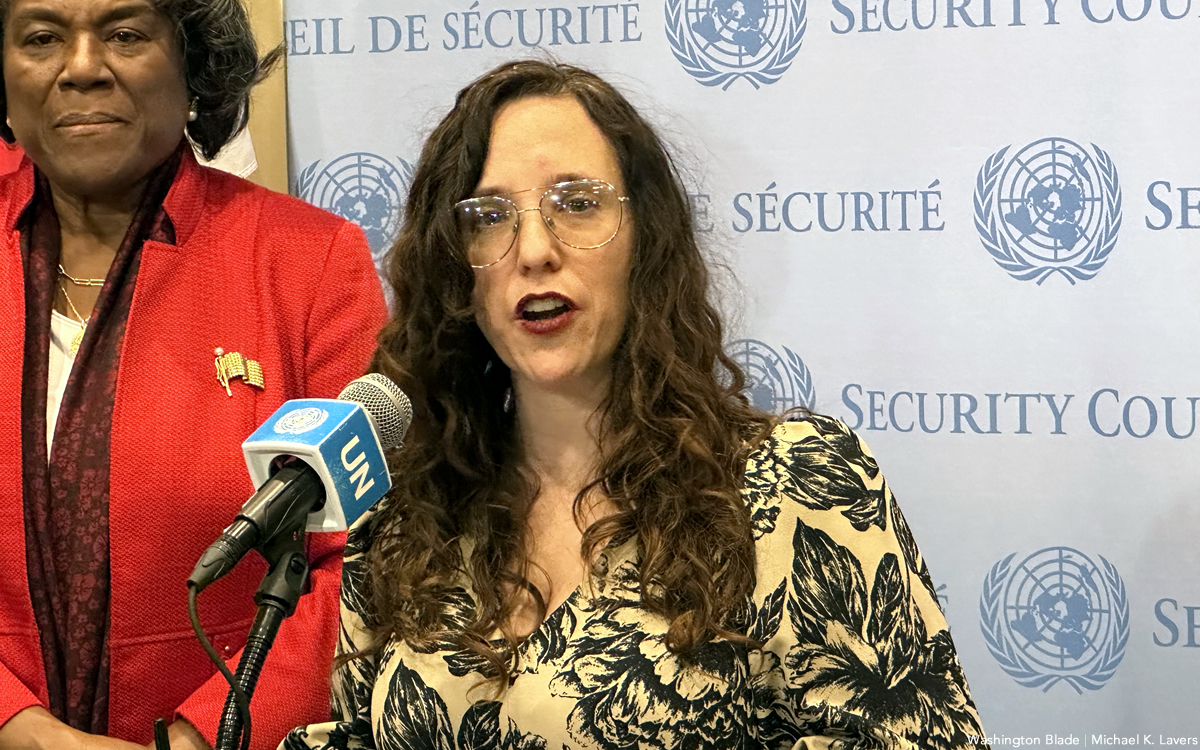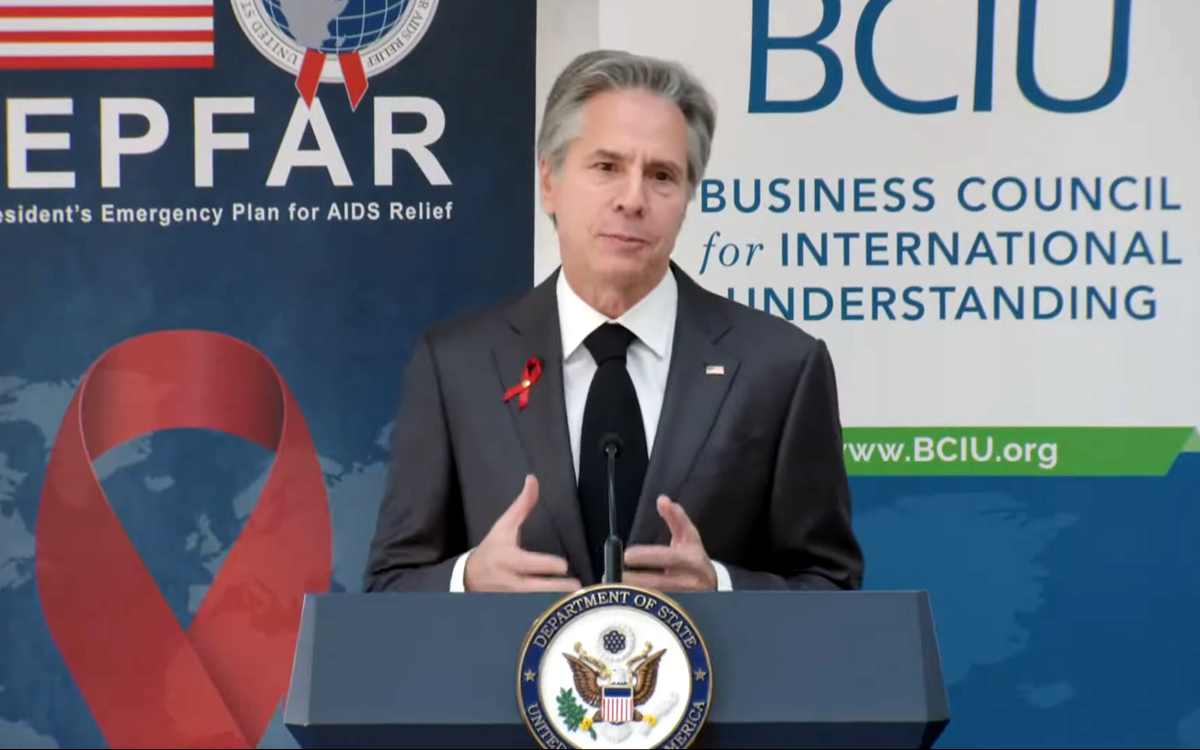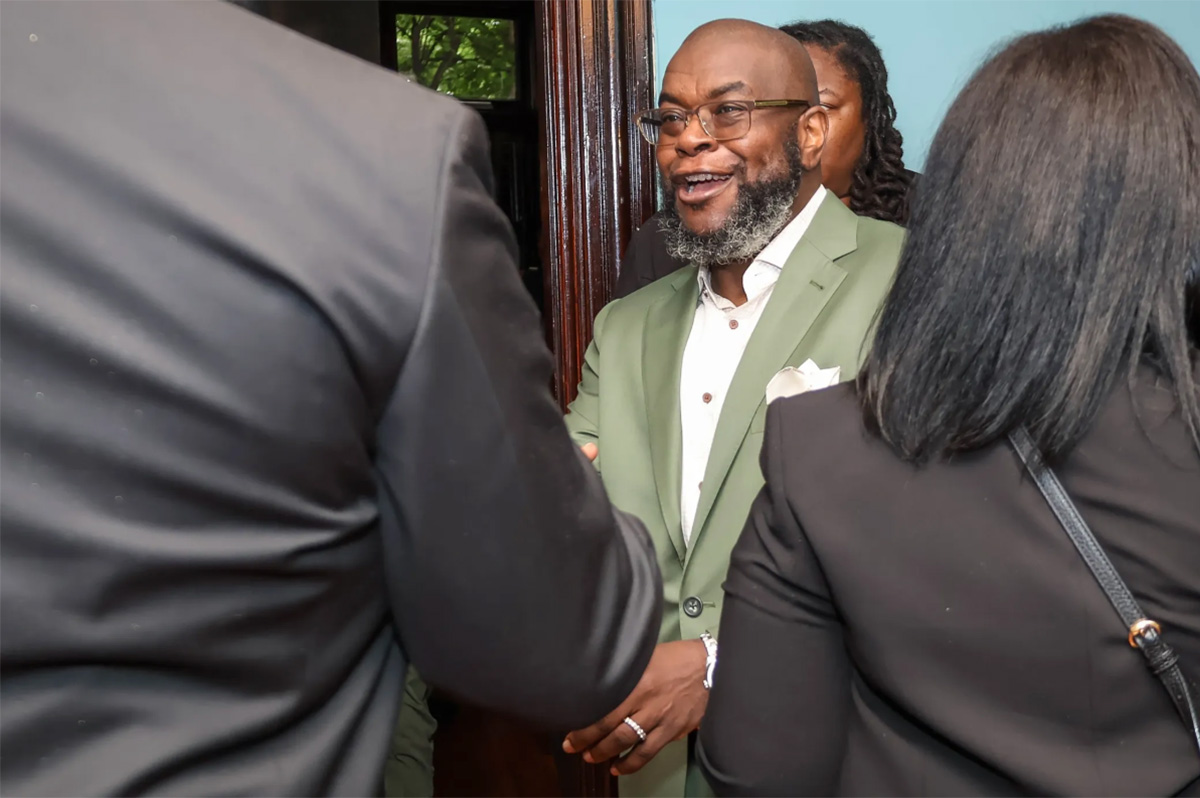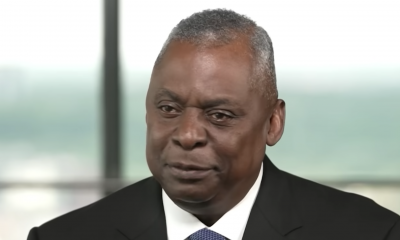National
‘Don’t Ask, Don’t Tell’ repeal ‘barely hanging on’
Activists apply last-minute pressure to White House, Senate

The prospects for repealing “Don’t Ask, Don’t Tell” this year continue to fade as LGBT advocates pressure the White House and Congress in hopes that lawmakers will take action before they adjourn for the year.
One Senate Democratic aide, who spoke to the Washington Blade on condition of anonymity, said repeal — currently pending before the U.S. Senate as part of the fiscal year 2011 defense authorization bill — is “barely hanging on with life support.”
“The only way to resuscitate this effort and get a ‘Don’t Ask, Don’t Tell’ vote is for President Obama and [Defense Secretary Robert] Gates to start pushing directly, something we on the Hill had expected the president and Gates to do long ago,” the aide said.
Frustration over the lack of movement on “Don’t Ask, Don’t Tell” prompted activists affiliated with GetEQUAL to take action on Monday and chain themselves to the White House fence in an act of civil disobedience.
The 13 protesters included Lt. Dan Choi, a gay Iraq war veteran who was discharged under “Don’t Ask, Don’t Tell” this year, and Robin McGehee, co-founder and director of GetEQUAL.
In a statement, GetEQUAL said three generations of LGBT activists were arrested as a result of the action. Others who were arrested include former Marine Corps Sgt. Justin Elzie, who became the first Marine discharged under “Don’t Ask, Don’t Tell” in 1993, as well as Michael Bedwell, a long-time advocate of LGBT rights and open service in the U.S. military.
As the protesters were chained to the White House fence, Choi called on President Obama to act on his promise to end “Don’t Ask, Don’t Tell.”
“After all his rhetoric, I think we must conclude that there is truth to the knowledge in homophobia of both sorts: there is a loud homophobia of those with platforms and there is a silent homophobia for those who purport to be our friends and do nothing,” Choi said. “Loud homophobia and silent homophobia have the same result. They must be combated and this is what we intend to do today.”
While the protesters were chained to the White House fence, they chanted the often-used GetEQUAL refrain of “I am … somebody … and I deserve … full equality.” The protesters also added a new refrain, “Barack Obama … Silent Homophobia!”
The protesters superglued their handcuff locks, and, despite repeated warnings from U.S. Park Police, didn’t remove themselves from the White House fence. As police forcibly removed the activists, they dragged their feet as they were hauled into a paddy wagon. It took five police officers to remove Choi from the fence, handcuff him and drag him to the van.
Army Capt. Jim Pietrangelo II, who previously was arrested for chaining himself to the White House, led the chants of the protesters with a bullhorn from Lafayette Park and shouted out to Obama as police dragged the activists away.
“Why are these courageous heroes having to be arrested now?” he shouted. “Mr. President, could you follow the lead of these brave Americans and stop ‘Don’t Ask, Don’t Tell?’”
Pietrangelo called on Obama to issue an executive order to stop the discharges under the military’s gay ban.
In a statement, Shin Inouye, a White House spokesperson, responded to the protest and said Obama is committed to legislative repeal of “Don’t Ask, Don’t Tell.”
“As we have said repeatedly, the president remains committed to a legislative repeal of ‘Don’t Ask, Don’t Tell,’” Inouye said. “The White House continues to work with Congress toward achieving that comprehensive and lasting solution.”
On Wednesday, White House Press Secretary Robert Gibbs expounded on Obama’s commitment to legislative repeal of “Don’t Ask, Don’t Tell” as he acknowledged that the president hasn’t yet reached out to senators to lobby them on the issue.
Asked whether Obama had made any phone calls to “swayable senators” such as Susan Collins (R-Maine), who voted “no” on moving forward with the defense authorization bill in September, Gibbs replied that he doesn’t believe the president has spoken to the Maine senator on the issue.
But Gibbs said he’d put passage of the defense authorization bill in the “same category” for passage as other items he mentioned that Obama wants to see in lame duck, resolving a tax cut issue and ratification of the START Treaty, a nuclear arms reduction agreement with Russia.
“The president believes that this can be done in a way, and should be done, as you heard Secretary Gates and others say, in the next few weeks,” Gibbs said.
Amid doubts about whether the White House would push aggressively for “Don’t Ask, Don’t Tell” repeal this year, Senate leaders are reportedly considering dropping the repeal language from the defense authorization bill to move forward.
Senate Armed Services Committee Chair Carl Levin (D-Mich.) reportedly acknowledged to reporters on Tuesday that taking the repeal provision out of the defense bill is on the table.
“I’m trying to get the bill through Congress,” Levin was quoted as saying. “I’m the committee chairman for a 900-page bill. ‘Don’t Ask, Don’t Tell’ is two pages of 900 pages. My focus is different from the media focus. I’m just trying to get a bill passed.”
Levin maintained that he wants get both passage of the defense authorization bill and repeal of “Don’t Ask, Don’t Tell,” but added “if I can’t get both done, I want to get one of them done.”
The White House issued a statement last week saying it opposed stripping the defense authorization legislation of its repeal language. Gibbs reiterated that position during the press conference.
“We ought to keep this in the defense authorization bill, we ought to pass this in the defense authorization bill, and we ought to end the policy that the courts are rapidly getting close to ending on a timetable that those in the bureaucracy might not [like],” Gibbs said.
Additionally, activists continued to pressure Senate Majority Leader Harry Reid (D-Nev.), who’s responsible for the legislative calendar in the chamber, to bring up the defense authorization bill with the repeal language.
On Monday, the staff for Senate Majority Leader Harry Reid (D-Nev.) offered non-answers to LGBT activists and veterans pressing for a commitment from the senator to bring “Don’t Ask, Don’t Tell” repeal to a vote in the lame duck session of Congress.
A group of about 20 activists affiliated with GetEQUAL — including nine LGBT veterans led by Choi — came to Reid’s Senate office in the Hart Office Building to demand answers on when the Nevada senator would move forward with major defense budget legislation containing repeal of the military’s gay ban.
“We’re here to essentially ask a very important question,” Choi said. “When is Sen. Harry Reid going to put the [fiscal year 2011 defense authorization bill] to a vote that’s inclusive of ‘Don’t Ask, Don’t Tell?’”
But the staffers offered no definitive answers to the inquiries on the defense bill, which is currently pending before the Senate, and said Reid is planning to meet with Senate Minority Leader Mitch McConnell (R-Ky.) later this week to discuss which legislative items would come up before lawmakers adjourn for the year.
A deputy chief of staff for Reid, who didn’t offer his name during the meeting, referred activists to a congressional military fellow and member of the U.S. Army in Reid’s office, who took activists’ questions and said he’d obtain responses for them. Reid’s office didn’t immediately respond to the Blade’s request to identify the staffers.
The source said he couldn’t give a date for when Reid intends to schedule the defense authorization bill for a vote.
“If I told you it’s Tuesday and it doesn’t come up until Wednesday — they’ve got three other cloture votes that they’ve got to get through this week,” the source said. “There are other things that are going on this week.”
The source maintained that passage of the defense authorization bill is “one of the bills that has to be done this year” because the legislation provides funding for the Pentagon and operations in Iraq and Afghanistan.
Still, activists insisted that Senate passage of the defense authorization bill with “Don’t Ask, Don’t Tell” repeal be done before the end of the year and pressed staffers on whether that would happen before Thanksgiving recess.
Most repeal supporters anticipate that the Senate would need two weeks to debate and vote on the defense authorization bill and that scheduling the vote early in lame duck is important.
Asked whether he could say whether the vote would come up before Thanksgiving, the Reid source replied, “I cannot.”
In a statement to the Blade, Jim Manley, a Reid spokesperson, said there’s “nothing new yet” with regard to scheduling decisions on the defense authorization bill.
In addition to questions about scheduling, the LGBT advocates also sought assurances that Reid wouldn’t strip the defense authorization bill of its “Don’t Ask, Don’t Tell” repeal provision before bringing it to the floor.
The Reid source said he “couldn’t tell you one way or another” whether the option of passing the defense authorization bill without the “Don’t Ask, Don’t Tell” repeal language is on the table.
“I honestly don’t know,” he said. “Because I am a fellow that’s one of the things that — I can look into it.”
Additionally, activists inquired about what Reid had done with Choi’s West Point graduate ring, which the Iraq veteran had given to the senator at the Netroots Nation conference in the summer to remind Reid of his commitment to repeal the 1993 law.
McGehee asked whether Reid was keeping the ring in a shoebox or in his desk and whether he has “forgotten that he made a promise in July.”
The fellow said he would look into the whereabouts of Choi’s ring.
At one point, McGehee called the fellow a “token military person” that Reid’s staff brought out to “act like” he knows LGBT issues.
“In my opinion, Sen. Reid has had the time to show the leadership, my parents are constituents of his state, and I feel like he’s failed not only them as constituents, but Lt. Choi, as a promise that he made in July,” McGehee said.
McGehee’s remarks riled the deputy chief of staff, who insisted the fellow wasn’t a token and that he was brought out because staffers thought he was the most appropriate person to answer questions.
In response, McGehee maintained activists weren’t shooting the messenger, but said if Reid wouldn’t give a commitment that “Don’t Ask, Don’t Tell” would come up before the Senate by the end of the year, activists would be back.
“It’s in his hands now,” she said.
State Department
Former US envoy for global LGBTQ, intersex rights slams Trump
Former President Joe Biden appointed Jessica Stern in 2021

Jessica Stern, the former special U.S. envoy for the promotion of LGBTQ and intersex rights, says the work that she and her colleagues did under the Biden-Harris administration is “being systematically dismantled.”
“As the person who was responsible for leading U.S. foreign policy on LGBTQI+ issues, it’s been very difficult for the past two months to see that work being systematically dismantled,” she told the Washington Blade on March 19 during a telephone interview.
Stern was the executive director of Outright International, a global LGBTQ and intersex advocacy group, when then-President Joe Biden appointed her in June 2021.
The promotion of LGBTQ and intersex rights was a cornerstone of the Biden-Harris administration’s overall foreign policy. These efforts specifically included the decriminalization of consensual same-sex sexual relations and marriage equality efforts in countries where activists said they were possible through the legislative or judicial processes.
The Trump-Vance administration’s decision to freeze most U.S. foreign aid spending for at least 90 days has had a devastating impact on the global LGBTQ and intersex rights movement. President Donald Trump’s executive order that bans the State Department from issuing passports with “X” gender markers has prompted Germany and several other European countries to issue travel advisories for transgender and nonbinary people who are planning to visit the U.S.
Stern said the Trump-Vance administration “has studied the anti-LGBTQI strategies of other countries and basically imported the worst ideas from around the world: The most violent, the most dehumanizing, the most targeting strategies.” Stern added these policies have emboldened Hungarian Prime Minister Viktor Orbán, Russian President Vladimir Putin, Argentine President Javier Milei and other anti-LGBTQ heads of state.
“It’s one thing when a small country that has limited global reach implements anti-LGBTQI laws and policies. It’s another thing when one of the world’s superpowers does so,” Stern told the Blade. “There’s no question that the U.S.’s regression on LGBTQI rights is actually going to accelerate backlash against LGBTQI people around the world.”
“We provide political legitimacy to those ideas, but also we’re forging new alliances and coalitions, and we’re pushing these ideas on other countries,” she added. “So, it’s not a passive action. The U.S. government currently is actively funding and disseminating anti-LGBTQI hatred around the world.”
Former State Department colleagues ‘afraid every day’
The Trump-Vance administration in a Feb. 3 statement that defended its efforts to dismantle the U.S. Agency for International Development noted examples of the organization’s “waste and abuse” included $2 million for “sex changes and ‘LGBT activism'” in Guatemala and $1.5 million to “advance diversity, equity and inclusion in Serbia’s workplaces and business communities.” Secretary of State Marco Rubio last month said 83 percent of USAID contracts have been cancelled, and the remaining will “now be administered more effectively under the State Department.”
Rubio after the Trump-Vance administration froze nearly all U.S. foreign aid spending issued a waiver that allowed the President’s Emergency Plan for AIDS Relief and other “life-saving humanitarian assistance” programs to continue to operate.
The Blade has previously reported PEPFAR-funded programs in Kenya, South Africa, and elsewhere have suspended services and even shut down because of a lack of U.S. funding. UNAIDS Executive Director Winnie Byanyima on March 24 said 6.3 million more people around the world will die of AIDS-related complications over the next four years if the U.S. does not fully restore its foreign assistance.
Stern said her former State Department colleagues are “afraid every day.”
“They never know, ‘Am I going to be fired today?’ “Am I going to be put on administrative leave?’,” she said. “I cannot even imagine what it’s like to go to work every day.”
Stern told the Blade her former colleagues tell her that “there’s not a lot of foreign policy work happening because there’s so much disruption being caused by DOGE (the Department of Government Efficiency).”
“Entire departments have been decimated,” she said, noting one of them has lost 60 people. “It’s almost inconceivable to figure out how to restructure your work when your resources have been decimated.”

Stern described herself as “an eternal optimist” when the Blade asked whether she thinks the U.S. can ever stand for LGBTQ and intersex rights abroad.
“You have to believe in human rights,” she said.
Stern said former Secretary of State Antony Blinken as “an ally on LGBTQI issues.” Stern also said many of her now former State Department colleagues thanked her and her team for their work before they left government.
“There’s so much compassion from straight and cisgendered allies, from career officials, people that are not human rights experts or specialists, people that don’t focus on the well-being of LGBTQI people, but people that care very much about the United States standing for its values, the rule of law, equality for all, and this notion that it is in our national interest to ensure that there is safety, prosperity, and well-being for people around the world,” she said.
“The situation we find ourselves in will not last forever,” added Stern. “What we have to do is figure out how to hold the line right now, and how to organize for the future.”
She stressed ways to “hold the line” include litigation, protests, letters-to-the-editor, demanding accountability from lawmakers.
“There’s so much to do,” said Stern.

Stern is currently teaching at Columbia University’s School of International and Public Affairs, and is writing about her experience as the “first-ever human rights expert to be the special U.S. envoy for LGBTQI rights.” Stern also told the Blade that she is working to launch a new organization.
“I love being an activist again,” she said. “If there was ever a time when activists are needed, it’s now.”
“I am really proud to have rejoined the resistance,” added Stern.
National
Destination Tomorrow works to empower LGBTQ community
Sean Coleman is Black transgender man who founded group in 2009

Sean Ebony Coleman became the first transgender African American to own and operate an LGBTQ center with the founding of Destination Tomorrow in 2009. Subsequent centers opened up in Atlanta in 2022 and D.C. in 2024.
Destination Tomorrow was founded on the idea that “it is more helpful to empower our most vulnerable TLGBQ+ community members in a way that takes them off the path of needing emergency care.”
“Our organization emphasizes economic, social, and mental empowerment through a variety of holistic educational, financial, support-based, housing, and health programs,” Destination Tomorrow said on the organization’s website.
With Transgender Day of Visibility today and WorldPride coming to D.C. this June, the Washington Blade spoke with Coleman to get some further insight into how Destination Tomorrow and other organizations are responding to the pressure the Trump-Vance administration is putting on the LGBTQ community.
BLADE: What was the overall reaction to the Trump administration and the heavy anti-LGBTQ rhetoric being pushed by the administration from Destination Tomorrow?
COLEMAN: I think the first thing was disbelief, right? You know he’s not well versed, but the embellishments about the community, particularly the trans community, were so outlandish that they became dangerous. So I think the first thing was, people actually believe this, and we have a message in problem because we’re not responding. We really missed an opportunity to message that differently. Like some of them it was so easy for us to respond and say, “We’re talking about the entire sports world when it comes to college and high school” and those kinds of things, right? We are definitely focusing on the wrong one percent.
I knew it was like collectively as a trans man, just personally, I was like “okay, so how do you show up now?” You’re in a position that folks expect you to at the very least have something positive to say next steps, this is what we’re gonna do, marching all this, whatever. I’m sitting with it like, no, I’m a little nervous. In the moment, most of the danger and most of the rhetoric is happening towards trans and gender nonconforming people and unfortunately, Black and brown and trans and gender nonconforming folks feel it worse when things like this happen.
BLADE: With a lot of organizations getting threats, losing funding, and everybody just being scared, has Destination Tomorrow specifically received any higher amounts of traffic to your locations, either here or other states?
COLEMAN: All three locations have seen an uptick. Funny thing a lot of them are coming in because they just want community. and we do that intake assessment. Then we say “while we have you here, we could do all of these other things.” But it’s really about them coming for community. If you know anything about us, we’re well versed in the house and ballroom community. So we put on balls. We’re planning one now.
And the young people, particularly young trans people, are also coming in for the ball, but they also want to know. Mr. Coleman, what can we do now? What is it? They want a call to action, want to be motivated and I think we have to figure out again this one message of where we’re going to go. Whether it is New York, Atlanta, and D.C., Destination Tomorrow is then going through all of the other trans into the nonconforming organizations. Speaking in one voice and figuring out what movement building looks like for us in this moment and we think that young people should drive it.
Particularly in New York and D.C. will receive some additional resources because we want to be able to address those folks that are going to come in. We want to make sure (to have enough) staff, (increase) our hours. We increase our security and our security presence because that was something that we were concerned about, even if it’s just an in person meeting that we’ve been doing for the last five years, because how do we keep those meetings and that meeting space and our identity safe?
BLADE: Do you feel like given the recent federal government layoffs and this whole Trump takeover of Washington, like, do you think D.C. is prepared or safe enough to start implementing those things that you want to try and get done?
COLEMAN: Yes. I think once we’ve taken a moment to step back and assess the situation, we will be able to come out stronger with the initiative that is going to be most important and most impactful for our community, but I think it is going to take some collaborative effort. I don’t think one agency is gonna be able to do it. I think this is a time for collaboration and allies. um, and not in that order. Right? But D.C. is definitely a safe place for LGBT community members worldwide.
It’s gonna be an amazing time. We’re gonna get an opportunity to show how resilient our community is, how much love we still receive. If you look at some things on social media, it’ll seem like everyone’s demonizing the trans and general nonconforming community and that’s not necessarily the case, right? I think we get sucked into this vacuum with social media and I think once you log off and you actually go outside, you recognize exactly how much support you have from your community. And I think that ties back into our messages. We’re not going to stand around sad and defeated. We’re going to show up, have a good time with WorldPride.
I also see it as an excellent opportunity to strategically put some plans in place. While we have you here, and we’re celebrating, we’re partying, but here is what our next steps will be. We have at least two or three next steps that collectively, you can go back down and all of us a picture goes saying two or three things. Say the same things, stay on message and I think World Pride will be an excellent opportunity to do so.
Along with the comments on TDOV and WorldPride, Coleman also spoke about the current state of LGBTQ politics.
“What’s so unfortunate for me is that we lean into our allies, right? Now is the time for our allies to take a look around the room and say “Oh wait. This person is missing [in the conversation], we should not be speaking on behalf of Black and brown people,” he told the Blade. “I specifically say Black and brown trans people. [Allies] shouldn’t be speaking on behalf of them because I know a few that can actually come here and speak on their own behalf and unfortunately it doesn’t happen. I think it’s because it’s tied into the losing funding across the board. So those LGB organizations are gonna feel that loss. And at some point they may feel like they have to step in and fill a void that they don’t necessarily have to because we’re here.”
Specifically in New York, Coleman has been looking toward the local government to help Destination Tomorrow and other organizations stay protected and operational during times like these.
“Trans, gender nonconforming and LGB issues go across different issues. Whether we’re talking about housing, criminal justice reform, or reproductive rights. We should be included in those discussions, and we should be included in those funding opportunities,” said Coleman. “And I think this gives us an opportunity to show that Destination Tomorrow has a program called Pride at Work. to the workforce development program, where we’re pitching it in D.C. and we’re actually in our third year of doing it in New York City. That’s an example of how workforce development should be for all of us, right?”
“So a lot of the work we’ve done in the last couple of months is really meeting with all our elected officials and saying, ‘This is the message that we’d like you to push. This is what we want to say, this is how we feel. Because you are not saying it, it feels like you left us behind. This is where you are missing the mark and it is up to you to fix it,’” he added.
A discussion for New York mayoral candidates took place later that evening. One of the things that Coleman wanted to heavily iterate to the candidates was that “at the end of the day, we’re paying attention now. We may not have been as politically engaged as we should have been, but we are now.”
U.S. Federal Courts
Second judge blocks Trump’s anti-trans military ban
Federal courts in D.C. and Washington State have now issued injunctions

The U.S. District Court for the Western District of Washington on Thursday became the second court to issue a nationwide injunction blocking the enforcement of President Donald Trump’s executive order barring transgender people from military service.
The order in Schilling v. Trump from Judge Benjamin Hale Settle comes after Judge Ana Reyes of the U.S. District Court for the District of Columbia blocked implementation of the ban earlier this month in Talbott v. Trump.
Friday was the date by which the Pentagon was to begin identifying and separating transgender service members from the armed forces, per Trump’s executive action.
The lead attorneys in Talbott v. Trump, GLAD Law Senior Director of Transgender and Queer Rights Jennifer Levi and Shannon Minter, legal director of the National Center for Lesbian Rights, shared statements about the injunction in a press release by NCLR.
“Given the thousands of brave and decorated transgender servicemembers facing unthinkable harms as the result of this ban, we are heartened but not surprised by today’s decision,” Levi said. “President Trump’s executive order and Secretary [Pete] Hegseth’s implementation represent a policy that cannot be constitutionally justified. Thousands of transgender servicemembers currently serving have clearly demonstrated they meet all military standards, with many deployed to critical missions worldwide, proving their capabilities beyond question.”
Levi continued, “These dedicated servicemembers and their families have earned our nation’s gratitude and respect, and the government has a responsibility to honor the commitments it has made to them. This is about keeping faith with Americans who have risked everything to defend our freedoms.”
“In both Talbott and Shilling, it was abundantly clear to the court that it must act swiftly to protect our troops from an unconstitutional and indefensible ban that would disrupt the lives and dismantle the careers of thousands of transgender servicemembers and their families,” Minter said. “The harms associated with this ban are gut-wrenching.”
Minter continued, “In each of these cases, the government did not even attempt to claim that any evidence supported its position. There is no reason to discharge individuals who are serving capably and honorably.”




















